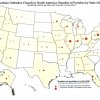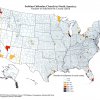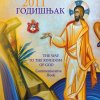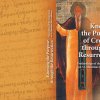Sidebar
Site Map
A great man is one who collects knowledge the way a bee collects honey and uses it to help people overcome the difficulties they endure - hunger, ignorance and disease!
- Nikola Tesla
Remember, remember always, that all of us, and you and I especially, are descended from immigrants and revolutionists.
- Franklin Roosevelt
While their territory has been devastated and their homes despoiled, the spirit of the Serbian people has not been broken.
- Woodrow Wilson
Maps of Serbian Orthodox Church in North America
by Alexei D. Krindatch, the research coordinator with the Assembly of Canonical Orthodox Bishops of North and Central America
- Serbian Orthodox Church in North America: Number of Parishes by State (2010) (including mission parishes and monastic communites)
- Serbian Orthodox Church in North America: Number of Adherents by County (2010)
Further information:
- Spasovic, Stanimir. The History of the Serbian Orthodox Church in America and Canada. 1941-1991. Belgrade: Printing House of the Serbian Patriarchate, 1998.
- Vukovic, Bishop Sava. History of the Serbian Orthodox Church in America and Canada, 1891-1941. Kragujevac, Serbia: Kalenic Press, 1998.
Diocese of New Gracanica and Midwestern America
Diocesan Hierarch:
His Grace Bishop LONGIN
Residence:
Protection of the Most Holy Theotokos Monastery
35240 N. Grant St.
Third Lake, IL 60046
Mailing address:
PO Box 371
Grayslake, IL 60030-0371
Office/Residence - 847-223-4300
Fax - 847-223-4312
Diocese of Eastern America
Diocesan Hierarch:
His Grace the Right Reverend IRINEJ (Dobrijevic)
Bishop of Eastern America
The Serbian Orthodox Church
Episcopal Headquarters
9 Friar Tuck Court
Warren, NJ 07059
Office telephone / fax: 908-647-5314
www.easterndiocese.org
Diocese of Western America
Diocesan Hierarch:
His Grace Bishop Dr. MAXIM (Vasiljevic)
Residence:
2541 Crestline Terrace
Alhambra, CA 91803
Office - 626-289-9061
Residence - 626-284-6825
Fax - 626-284-1484
Diocese of Buenos Aires
Diocesan Hierarch:
His Grace KIRILO (Bojovic),
Bishop of Buenos Aires and South-Central America
Annual Books of the Western American Diocese
1. ANNUAL 2011
(pdf 7.8 MB)Commemorating the Ninetieth Anniversary of the Establishment of the First Serbian Diocese for America and Canada (1921-2011)
.






